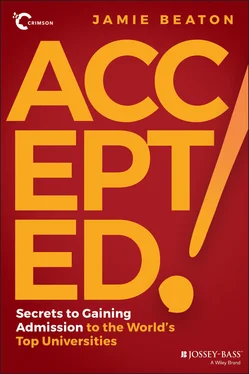Although it is nice to imagine a world in which the results of our youth do not meaningfully affect our future or an environment in which everyone is judged by their merits and on nothing else, this is terrible parenting advice for a young person. The reality is there is no launchpad that can propel you into a career of success, significance, and impact with the same consistency as a college degree from a top institution.
I've sent more than 1,000 students to the world's best universities, and like clockwork they land jobs at the types of institutions that offer life-changing opportunities: Blackstone, the world's largest private equity firm; Google DeepMind, the world's leading artificial intelligence lab; McKinsey, the world's most prestigious management consulting firm; Goldman Sachs, the world's most competitive investment bank. Despite the fact that these companies have massive resources, they can't go on a worldwide talent search for every single position. Rather, they inevitably gravitate to recruiting from the same pool of highly selective colleges. These colleges have already done a lot of the heavy lifting for them in assessing vast swathes of young people and deciding who can get in and who gets rejected. The colleges take the process even further: forcing their students to compete head-to-head, ranking them numerically with a grade point average that enables firms to easily assess who thrived and who struggled once they hit these bastions of competition and academic excellence.
As a young person, you can tell yourself that college doesn't matter or that high school has nothing to do with your career, but the reality is, in virtually all scenarios, the easiest and most effective path to success is getting into an elite college and making the most of that opportunity.
Many critics have asked why these elite colleges are important. Does Harvard have the best teachers? A lot of classes are taught by graduate students. Do the endless laboratories and resources really change the experience of the average student? I never set foot in one in my time there. Does Harvard have the best career advice? I never went into the on-campus career services—not a single time.
The answer to why these colleges are so important sits with a Nobel Prize–winning, human capital theorist, Gary Becker. Becker coined the phrase “signaling,” 1 which refers to the power of a student's education credentials to act as a signaling device to future employers or postgraduate admissions officers as to their superior innate abilities. In a busy world, no one has the time, money, or knowledge to be able to actually audit people's real ability. As a result, they rely on signals of quality in order to proxy real ability. The college degree is the ultimate signal of ability. How many times have we come across an Ivy League “genius” in a Hollywood movie like the Yale-educated data scientist played by Jonah Hill in Moneyball ? Or the aspiring diplomat who happens to be a Rhodes Scholar (check out Charlize Theron in Long Shot )? Or as the ferocious corporate lawyer from Harvard Law School (Harvey Specter in Suits) ? Nothing is a faster proxy for ability, skill, and academic firepower in mainstream media than your university education.
Now, let's get something straight. Is it true that the world's best 1,600 undergrads for a given year are all sitting in Harvard's seats? Absolutely not. Many of the world's best young people may not know that Harvard's financial aid policy means anyone who gains admissions can get enough funding to be able to attend. Many would never have considered applying. Many more may not have the opportunity to attend college because they have to financially support their family (which says reams about their character).
Regardless, the market is an efficient sorting mechanism that doesn't try to get everything right but get it approximately right. On average, will a Yale Law graduate be a fantastic lawyer? Probably, yes. On average, will an MIT artificial intelligence PhD be able to convince the public of the importance of some new data privacy laws over your average Joe? Probably, yes. On average, will a Stanford undergrad seem like the kind of person who could be the next unicorn founder in Silicon Valley? You bet (thanks Evan Spiegel! 2 ).
Signaling goes beyond just a college degree. There are signals on signals on signals. McKinsey can charge out their case teams at $1 million/week. Why? It might start with their nickname of “McHarvard” where they recruit seemingly endless numbers of Harvard graduates, Rhodes Scholars, and other talented young people from brand-name schools so they can market every case team as being full of “whiz kids.” A million/week for primarily 22- to 26-year-olds with limited work experience on your most pressing business issues? It sounds like a scam. But these young people went to a top college. Okay, then that makes sense.
Now let's think about Silicon Valley. My cofounders at Crimson have been able to raise more than $US60 million before our 25th birthdays. This is our first business. We have no track record. Prior to going to Harvard, I really genuinely thought entrepreneurship was what you said you would do if you found yourself unemployed. This is rare but it is by no means a major exception. The most popular schools of unicorn founders (companies valued above $US1 billion) in the US were Stanford, Harvard, UC Berkeley, MIT, and the University of Pennsylvania (Wharton School of Business). 3 As a venture capitalist writing big checks with other people's money, being able to assure your investors that your entrepreneur is “investable” (a term I first heard from GGV investor Hans Tung, that is, they have impressive academic credentials that give a good clue that the person is of substance and likely to succeed) captures the power of signaling perfectly.
Fast-forward to a corporate boardroom for an executive appointment at a major technology company. A partner from one of our venture capital firms said to me that they only consider an executive at this level for a strategy role if they have been trained by one of the greats: Bain, McKinsey, or Boston Consulting Group. Hold on? If these management consulting firms hire based on the signal of a college degree and now it is indeed those firms that are acting as the signal for executive hires—what does that mean?
The answer is obvious. Your college degree is incredibly important. It sets up a reputational snowball that will affect every facet of your working life. It may even affect your dating life!
When I first wrote about this at the age of 16 in our student newspaper at King's College, my wonderful English teacher told me to shelf the article because it was “too depressing.” Why? I'd wondered to myself.
As long as you as a young person or a parent go into education with eyes wide open, understanding the Herculean high-stakes competition in front of you and how to beat it, knowing this is one of the most impactful things you can do for your motivation, then it is not depressing but just a situation you know you need to negotiate.
Once negotiated, the rewards are limitless and all the effort expended are not just worth it but life changing in more ways than you can imagine. So let's dive into the nitty gritties starting with my first piece of strategy advice on class spamming—the ultimate case of when more means more.
1 1. Becker, Gary S. Human Capital: A Theoretical and Empirical Analysis, with Special Reference to Education. 2d ed. New York: Columbia University Press for NBER, 1975.
2 2. Evan Spiegel is the cofounder and CEO of Snap. His estimated worth is $US13 billion. https://www.forbes.com/profile/evan-spiegel/?sh=7b5a3b4f529c
3 3. Parker, Tim. Where Do Unicorn Founders Go to College? Investopia.com. Updated August 17, 2020. https://www.investopedia.com/articles/small-business/021017/where-do-unicorn-founders-go-college.asp
Читать дальше












